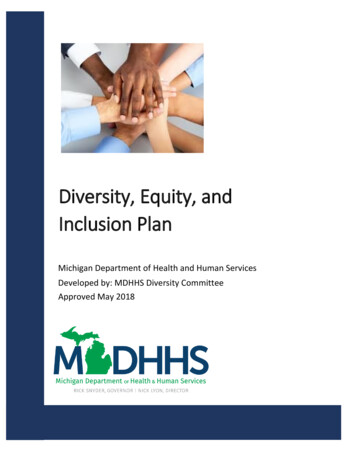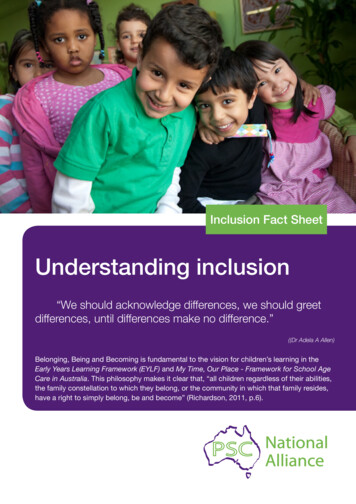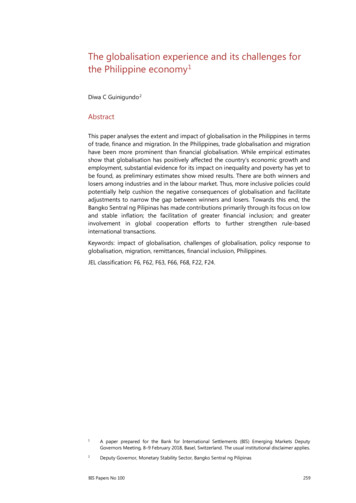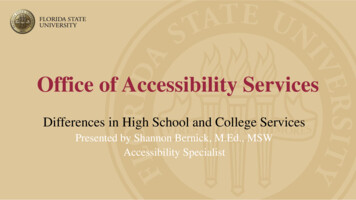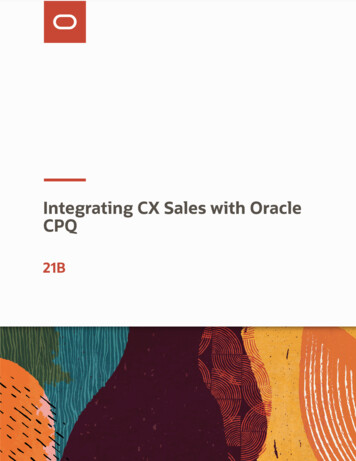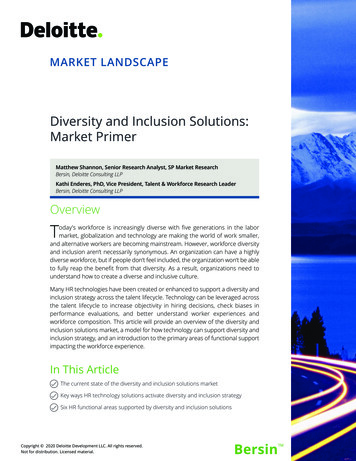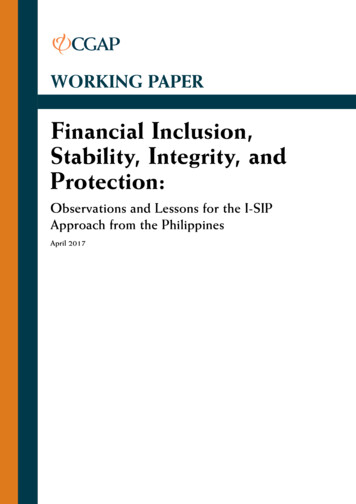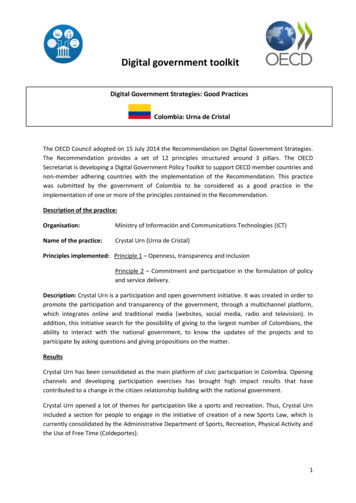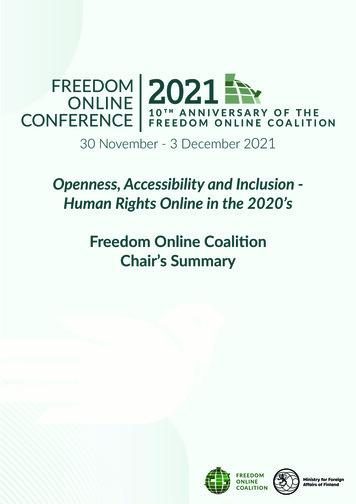
Transcription
30 November - 3 December 2021Openness, Accessibility and Inclusion Human Rights Online in the 2020’sFreedom Online CoalitionChair’s Summary1
Table of ContentsLetter of the ChairConference OverviewConference Session Summaries3Opening Plenary: Open and Accessible Internet for All7Session 1: Combatting the Rise of Digital Authoritarianism7Session 2: Beyond T-FAIR: Exploring Lessons Learned767Session 3: Beyond Pegasus: Improving Transparency, RightsProtection and Accountability in the Surveillance Tech Space 8Session 4: International Cybersecurity and Human Rights: APrimer8Session 5: Multistakeholder Approach to Develop GuidingPrinciples on Diversity of Content Online9Session 6: Promoting Meaningful, Equitable Internet Access 9Session 7: Civil Society Briefing for AHC-FOC Membership:Digital Rights, Human Rights, and a UN Cybercrime Treaty9Session 8: Data and Human Rights: Striving for MeaningfulTransparency and a Fair Data Economy10Session 9: How to Avoid Digital ID Systems That Put People atRisk: Lessons from Afghanistan10Session 10: FOC Task Force on Internet Shutdowns andDefending Democracy Online10Session 11: Regulating (Dis)Content: How Human Rights CanHelp Shape Government Content Regulation Efforts11Session 12: Tech for Democracy and Ways to Jointly,Responsibly, and Proactively Take Action12Closing Plenary: FOC 10th Anniversary Ministerial Meeting12Ministerial Roundtable Session Summaries13ANNEX 1 - List of Session PanelistsANNEX 2 - Ministerial Meeting Speakers14182
Letter of the ChairDistinguished Members of the Freedom Online Coalition and the FOC Advisory Network,Dear Colleagues,The year is approaching its end, and it is time to take a look at Finland’s Chairship of the FreedomOnline Coalition (FOC) during 2021. It has been a great honor to chair the Coalition during its 10thAnniversary.We wish to extend sincere thanks to all FOC member states, the Friends of the Chair, the FOCdiplomatic networks, the working groups and task forces, the FOC Advisory Network (FOC-AN)and the FOC Support Unit (SU) for excellent cooperation, support and engagement this year. It hasbeen a pleasure to welcome two new members, Italy and Luxembourg, to the FOC. Together wehave succeeded in developing the FOC’s work during a time when the COVID-19 pandemic hassignificantly limited international cooperation.We have had a busy year advocating for the FOC 2021 priorities including disinformation, digitalinclusion, cybersecurity, artificial intelligence (AI) and challenges by authoritarian regimes. The FOC’smessage on these issues have been voiced in numerous events throughout the year, namely at theAlliance for Multilateralism Ministerial Meeting, World Press Freedom Day Conference, StockholmInternet Forum, RightsCon, Internet Governance Forum and Summit for Democracy. The FOClaunched the Joint Statement on Spread of Disinformation Online. The development of the statementwas led by Finland and the United Kingdom.In March, the Coalition members gathered for the 10th Anniversary Roundtable Discussions. Theseconsultations provided us with a great opportunity for reflecting on the FOC’s achievements duringthe past 10 years and ways to enhance the Coalition’s influence going forward. Some of the solutionsidentified by the members were further focusing on diplomatic coordination, supporting global Southmembers’ engagement in the FOC, increasing the FOC’s internal and external visibility, revisiting theFOC policy on not issuing country-specific statements, strengthening engagement with the FOC-ANand easing the administrative burden.One of Finland’s priorities during the Chairship has been to reinvigorate the FOC diplomaticcoordination. As a joint effort, we have been able to breathe new life into the FOC diplomatic networksin Geneva, Paris and New York. We have raised awareness of the FOC and its work among relevantstakeholders and facilitated FOC coordination to help shape discussions and outcomes in relevantprocesses.We encourage the future network leads to focus on a selected few priorities and processes the FOCcan have an impact on. Colleagues at missions are warmly encouraged to continue active engagementthrough the FOC diplomatic channels.During the 47th session of the United Nations Human Rights Council (HRC) we presented a JointStatement on Freedom of Expression Online, a timely statement joined by all Coalition members. Welook forward to continued engagement by the FOC in the HRC and in other relevant UN and regionalbodies.This year Finland organized outreach in Africa through virtual discussions on cybersecurity, digitalinclusion and gender-based violence as well as a dialogue with representatives of the African Union(AU). We thank Ghana, Kenya, Tunisia and Germany for their support. We hope the FOC, as a unique,global actor bringing together countries from all continents, will continue advancing regional dialoguein the future.3
Following the members’ feedback in the 10th Anniversary Roundtable Discussions, we developed acomprehensive communications strategy for the Coalition and hope that it will help the FOC advocacyin the years to come. Progress has already been made in enhancing the FOC’s presence on socialmedia. The Coalition’s visibility will grow even more as information about its activities are increasinglyshared on the member states’ own communications channels.Human rights violations and online harassment are part of the long-term democratic decline and theascendance of authoritarian alternatives to the open, interoperable, secure Internet, which challengeuniversal human rights. At the FOC Strategy and Coordination Meeting (SCM) on 29 November,FOC members agreed to move forward with Finland’s proposal on Next Steps Concerning theFreedom Online Coalition’s Policy on Country-Specific Statements. The decision’s implications for theStockholm Terms of Reference (ToR) are now under silence procedure. We hope all members will beable to accept the proposed amendments.The amendments to the ToR would allow the FOC to raise and react to topical human rights questionsin order to better champion human rights online in the 2020s. At the same time, it is important toreserve statements with country-specific mentions to the most critical situations and for specificcontexts such as the HRC.The first ever virtual Freedom Online Conference celebrated the 10th Anniversary of the Coalitionwith more than 800 registered participants, 13 panel discussions and the launch of the FOC TaskForce on Internet Shutdowns. The Conference culminated in the FOC Ministerial Meeting whichbrought together Ministers from almost all member states to share their vision for Internet freedomand the FOC in the 2020s. In our view, this demonstrates the member states’ continued commitmentto the FOC and its increasing significance in the future.During the Ministerial, we heard from former Dutch Minister of Foreign Affairs Uri Rosenthal, formerUS Secretary of State Hillary Rodham Clinton and FOC AN Co-Chair Elonnai Hickok. They reflectedon the journey of the FOC and the future of the open Internet and inclusive digitalization. TheFOC Ministerial Meeting launched the FOC 10th Anniversary Helsinki Declaration for a rules-based,democratic and inclusive world and for a free, open, interoperable, secure, and reliable Internetworldwide. The Declaration and its 10 key commitments will direct the Coalition’s work in the 2020s.A vital part of the FOC’s work are its multistakeholder task forces and working groups. The Task Forceon AI and Human Rights, the Task Force on Digital Equality and the Silicon Valley Working Grouphave actively engaged members and stakeholders in coordinating FOC efforts in the fields of AI,digital inclusion and building new forms of cooperation with the global technology sector. They will allcontinue their essential work next year.The support and insight of the FOC-AN are instrumental for the FOC. Through issuing proactiveadvice, the FOC-AN has an important role in raising critical issues the Coalition should address. Thisyear, Finland as the Chair, started a practice of joining the FOC-AN monthly calls. This has been veryuseful for enhancing open and direct dialogue between the FOC member states and the FOC-AN. Wewarmly encourage continuing this practice in the coming years.The SU plays a key role in ensuring continuity of the Coalition’s activities and maintaining itsinstitutional memory. We wish to warmly thank the whole SU: Lea, Zora, Nuša, Nicholas and Tea.Your expert support, assistance and advice in organizing and developing the FOC’s activities is greatlyvalued.Finland is delighted to pass on the Chairship to Canada. We thank the Government of Canada foreffortless cooperation throughout the year and a seamless transition process over the last few months.We are certain that the Coalition will continue to flourish under the Canadian leadership in 2022.4
As we all agree, the FOC’s mission to promote Internet freedom and to protect human rights online ismore vital than ever. In the 2020s, we need a strong and well-functioning Freedom Online Coalition.Finland will continue as an active FOC member in order to carry out our commitments towards arules-based, democratic and digitally inclusive world with you. We invite all members to join in thiseffort.On behalf of the Ministry for Foreign Affairs of Finland and Finland’s FOC Team,Rauno MerisaariAmbassador at-Large for Human Rights and Democracy5
Conference OverviewFrom 30 November to 3 December 2021, the 10th Anniversary Freedom Online Conference tookplace under the theme “Openness, Accessibility and Inclusion – Human Rights Online in the 2020’s’’.For the first time ever, the Freedom Online Conference was held virtually, and despite challengingcircumstances related to the Covid-19 pandemic, it gathered more than 800 participants from 72countries over four days across various stakeholder groups.With the FOC celebrating its 10th anniversary under Finland’s Chairship, 2021 has provided anopportune moment for the Coalition to pave the way forward for the promotion and implementationof a human-rights based approach to Internet governance and digitalization in the coming decade.Internet freedom continues to be a key enabler for economic and social development, expandingcivic participation, access to information, and unlocking the opportunities of emerging technologies.Internet connectivity has become an essential means to access services, participate in society andexercise human rights and fundamental freedoms.However, persistent digital divides are urgent concerns. A significant part of the world’s populationremains offline or unable to participate meaningfully online, further exacerbating existing inequalities.The Covid-19 pandemic has deteriorated the situation further and the world has witnessed a growingnumber of Internet shutdowns and misuse of emerging technologies. Democracy and human rightsin the digital age hinge on meaningful access to and rights-respecting development and use of digitaltechnologies for all.At this juncture of opportunities and challenges, the FOC’s mission to promote Internet freedom andprotect human rights online is more vital than ever. Providing a unique multistakeholder forum, the2021 Freedom Online Conference brought together governments, civil society, academia, the privatesector and others to discuss and share information on the most urgent challenges to Internet freedomand the enjoyment of human rights in the digital space, and advance the FOC’s vision for promotingInternet freedom, human rights and a digitally inclusive world in the 2020s.The Conference featured more than 70 speakers, outlined in Annex 1, and 13 sessions coveringpriority issues of the FOC outlined in the Program of Action 2021, including disinformation, digitalinclusion, artificial intelligence, cybersecurity, challenges by authoritarian regimes, as well as othertopics related to Internet freedom raised by the broader community.The event culminated with a high-level Ministerial Meeting on Friday, 3 December, which featuredremarks from more than 30 high-level government representatives, outlined in Annex 2. TheMinisterial Meeting provided an opportunity for the FOC to launch its “Freedom Online Coalition 10thAnniversary Helsinki Declaration - Towards a rules-based, democratic and digitally inclusive world”.The Helsinki Declaration, signed by all FOC members, outlines the Coalition’s vision on stepping upefforts to protect Internet freedom in the coming decade, and reaffirms its commitment to protectand promote human rights for all, both offline and online.A key takeaway from across all Conference sessions was the notion that tackling issues relating tofreedom online must be done in a way that respects international human rights law, and by advocatingfor the existing universal human rights framework in global forums. The Conference reaffirmed thatmultistakeholder engagement must be at the heart of FOC’s activities going forward.The Conference also provided strategic opportunities for the FOC and FOC Advisory Network (FOCAN) members to gather in internal virtual meetings, including a Strategy and Coordination Meeting,and a Joint FOC and FOC-AN Roundtable.6
Conference Session SummariesOpening Plenary: Open and Accessible and Internet for AllThis session focused on the current challenges and opportunities for achieving an open and accessibleInternet for all, directly addressing the topic of the FO Conference - Openness, Accessibility andInclusion. The multiskaholder panel highlighted the need for access and focused on the economic andsocial barriers to access which were often reinforced and further exacerbated during the Covid-19pandemic. The panel also sought to reflect on the consequences of unequal access globally, such asemerging new challenges like mis- and disinformation, online abuse, particularly against marginalizedgroups, network disruptions etc.A key takeaway was that access to information, civic and democratic engagement, economicempowerment, achieving gender equality and eliminating poverty all require meaningful and equitableaccess to the Internet, digital services and technologies. The panel further emphasized that this canonly be achieved through establishing multistakeholder partnerships. They argued that framing accessto the Internet as a human rights issue and focusing on increasing investment, infrastructure anddigital literacy, can help drive an open, secure and inclusive Internet based on respect for humanrights globally.Session 1: Combatting the Rise of Digital AuthoritarianismThis session focused on digital authoritarianism and sought to highlight current global trends andchallenges, specific examples and the role of democracies, as well as solutions to address the issueglobally. The multistakeholder panel recognized digital authoritarianism as more than just a matter ofmalign application of technology - but as a competing model of governance that is spreading aroundthe world, sometimes even being replicated within democracies. The panel highlighted the urgency ofthe issue and called attention to the double-edged sword of digital technologies on societies - whilethe Internet has provided unprecedented opportunities for empowerment online, it has also degradedthe quality of democracies with the Covid-19 pandemic further exacerbating the threat to freedomonline.The panelists, however, agreed that multistakeholder forums like the FOC, can be a vehicle todrive solutions by both offering a platform for open discussions and by setting an example. A keytakeaway was that only through a genuine multistakeholder process, whereby all, including voicesthat are not often represented, jointly participate in the discussion, digital authoritarianism can besuccessfully addressed. The panel highlighted the need for a bigger commitment to transparency, byboth governments and the private sector, and for a bigger focus on increasing funding and prioritizinginnovation. An emphasis was also put on the importance of access and meaningful connectivity toaddress digital divides and build digitally inclusive societies globally.Session 2: Beyond T-FAIR: Exploring Lessons LearnedThe aim of this session was to reflect on the work of the FOC Task Force on Artificial Intelligence(T-FAIR) toward advancing the application of the international human rights framework to the globalgovernance of AI. The panelists recognized AI technology as a geopolitical issue of growing importanceand a source of immense benefits but also of potential adverse effects when in the hands of badactors.In line with this understanding of AI, panelists suggested ways for the FOC and other task forces tomake governance more effective and inclusive, foster international multistakeholderism, and raise7
awareness around their priority issues. These included having the FOC focus on a small number ofcases of malicious use of AI that raise the greatest number of concerns. Furthermore, the panelistsrecommended a genuinely multistakeholder approach that involves raising awareness and sharingknowledge among a wide group of stakeholders such as end users, AI technology developers, privateactors as both suppliers and deployers of AI, governments as both deployers and regulators, lawmakers,and civil society groups. Finally, the panel highlighted that governance should be about leadership andguidance, and practically feasible at both international and national level. Effective governance shouldalso take ethics and social justice frameworks into consideration, and require regular assessment andrevision depending on whether existing laws are sufficient or if further regulation is necessary.Session 3: Beyond Pegasus: Improving Transparency, Rights Protection andAccountability in the Surveillance Tech SpaceRecent reporting from the Pegasus Project has highlighted the extent to which surveillance technologyis being used to unlawfully penetrate the private communications of activists, journalists, and politicalfigures. The providers and clients of these technologies both have strong incentives to remainsecretive about their relationships, which has made regulation and accountability for abuses difficultto enact. This session explored ways to improve transparency, rights protection, and accountability inthe surveillance tech space.The panelists agreed that multistakeholderism can be a tool for accountability, transparency, andoversight, and discussed regulation and institutional mechanisms that would be effective in preventing,detecting, and providing remedies in surveillance abuse. It was noted that it is the responsibility ofstates to regulate the surveillance industry, but highlighted the problem of the industry not beingsusceptible to public pressure due to their business models. When looking at any kind of regulation,transparency will be one core principle that would need to be incorporated in local legislation. Thepanelists emphasized the need to consider the implications of surveillance technologies on humanrights, and translate existing human rights frameworks into principles and clear standards thatgovernments are more comfortable with.Session 4: International Cybersecurity and Human Rights: A PrimerThis session aimed to introduce to the FOC how human rights have been addressed in the contextof multilateral cyber processes, in particular on the Group of Governmental Experts (GGE) and theOpen-Ended Working Group (OEWG), and the norms of responsible state behavior such instrumentscontain.The panel gathered speakers from different stakeholder groups who brought diverse perspectiveson these issues. The speakers highlighted how these UN processes and its commitments to humanrights have evolved throughout the years, from initial recognition of the link between human rightsand cybersecurity, to the adoption of a specific norm focused on human rights. The panelists sharedthe following recommendations for the upcoming OEWG: continue raising awareness of existingcommitments to human rights, sensitization, awareness raising and capacity building should happenat all levels and across stakeholder groups, states should be encouraged to develop and implementcybersecurity frameworks in a human rights respecting way, ensure complementarity betweencybersecurity processes and other UN goals such as the Sustainable Development Goals (SDGs), andcontinue recognizing the value of multistakeholder discussions.8
Session 5: Multistakeholder Approach to Develop Guiding Principles on Diversityof Content OnlineThis panel addressed the importance of using a multistakeholder approach in developing best practicesin digital policy through the example of the Canadian government’s “Diversity of Content in the DigitalAge” initiative. This initiative aims to ensure that citizens are able to access diversity of content onlinein a way that bolsters resilience to disinformation and encourages social inclusion and cohesion.The panelists emphasized how no single entity within the public, civil society, or private sector has thesolution for this issue, which is why a multistakeholder processes is necessary. They also discussedchallenges to such an approach, including the difficulties larger entities (such as governments andmultinational companies) face in presenting a unified position, the need for more data to inform suchprocesses, the complexity of coming to a consensus when each stakeholder has different incentives,and the need to establish common definitions for key terms (particularly, the meaning of diversity inthis context) before the process can even begin. The panelists concluded that such processes requirea steady stream of data to ensure their outcomes are as up-to-date and diverse as possible.Session 6: Promoting Meaningful, Equitable Internet AccessThis session brought together panelists in a discussion on digital divides and inclusion efforts. Thediscussion emphasized on the definition of meaningful access, which extends beyond the physicaldevices people use to connect to the Internet and beyond their ability to connect in the first place.Rather, meaningful access relates to users’ technical know-how as well as their capacity to participateand have a say online and in policy processes. In the course of the discussion, that capacity was in turnrelated to questions of agency and empowering users. Finally, the panelists considered accessibilityas closely tied to the legal and economic frameworks users are set in. Taking these features intoconsideration, the panelists concluded that meaningful access is a layered concept that varies acrosscontexts and as such requires a holistic understanding. The speakers also called for understandinghow meaningful access could be ensured in practice and taking action to that end.Session 7: Civil Society Briefing for AHC-FOC Membership: Digital Rights,Human Rights, and a UN Cybercrime TreatyThis session aimed to gather stakeholder perspectives on a new process underway at the UN todevelop a cybercrime treaty, the Ad-Hoc Committee on Cybercrime. The panel explained thelogistics agreed so far, including the commitment to work by consensus, the timeline for drafting theconvention, number and location of sessions. The panelists emphasized concerns around stakeholderaccess to the meetings, reiterating the importance of open and inclusive modalities with clarity onopportunities to engage and transparency and access to meeting documents and discussions. It wasalso noted however that non-governmental stakeholders can and should take advantage of informalopportunities to engage (e.g. track 1.5 dialogues, informal convenings).One major concern noted by all panelists is the use by countries of cybercrime as a lever to exertcontrol over legitimate activities online and the importance of ensuring that any new treaty doesn’tundermine existing efforts, such as the Budapest convention. It was noted that in the 26 submissionson the scope of the convention so far from member states, a number of countries did not makereference to human rights or only made reference to particular rights. Therefore, it was suggestedthat the treaty reaffirm international human rights law, maintain a narrow scope with regards to whatis criminalized, and not seek to negotiate procedural standards. Finally, the panelists highlighted thatthe FOC has real potential to bring together strong and diverse views to advocate for human rightsat the AHC.9
Session 8: Data and Human Rights: Striving for Meaningful Transparency and aFair Data EconomyThe increasing volume and types of data being collected by companies and governments over the lastdecade, compounded by the rise of automated data processing and AI systems, have led to challengesand placed an even greater burden on both information and communications technology companiesand governments to increase transparency to the public about how their personal data is used andshared.The session looked at these issues around transparency and accountability from an angle of humanagency, human rights and freedom online. It explored the concept of a fair data economy - one wherethere is added value and where companies understand the value of sharing data; where there is balance,sovereignty, and which unlocks the use of data to thrive. The panel also explored solutions and goodpractices such as developing data protection legislation, accountability frameworks, and mandatorytransparency reporting. In addition to specific examples of measures, speakers highlighted the valueof bottom-up approaches and multistakeholder processes to develop frameworks and initiatives tofoster transparency and accountability.Session 9: How to Avoid Digital ID Systems That Put People at Risk: Lessonsfrom AfghanistanThe panel discussed the proliferation of Digital Identity Systems across the world, and highlightedrisks, lessons and guidance for the creation and implementation of digital ID systems by drawingon their own research, policy engagement and advocacy experience. The panel did so by lookingat recent events unfolding in Afghanistan, where the risks of implementing a digital ID system havebeen overlooked - with potentially devastating and widespread consequences. The panel challengedthe narrative around the digital ID systems and the assumption that these programs enhance theefficiency of government services and empower marginalized users, showing that these systems alsobring risk and could violate their human rights.As a key takeaway, the panel highlighted that robust human rights risks assessments and appropriatehuman rights safeguards are crucial to prevent abuse of the systems. When evaluating digital IDsystems, assessments should therefore include three elements - a rule of law test, a rights based test,and a risk test.The panel also highlighted the importance of the unique national context, and urged authorities to nottake a “one size fits all” approach. While there is a proliferation of ID systems across the world, panelistspresented research that showed that most systems are designed similarly and still rely on centralizeddatabases and systems that are primarily biometrics-based. The panel encouraged the internationalcommunity who advocate for and support digital ID systems to ensure that risks to human rights areappropriately assessed and to put appropriate safeguards in place to prioritize people from the verybeginning of the design phase.Session 10: FOC Task Force on Internet Shutdowns and Defending DemocracyOnlineCo-chaired by the US State Department, and members of the FOC Advisory Network, the GlobalNetwork Initiative and Access Now, the new FOC Task Force on Internet Shutdowns will aim toaddress Internet shutdowns trends and to respond to network disruptions in real time. This sessionserved as the launching point of the Task Force and aimed to further define its role and focus. Themultistakeholder panel called attention to the FOC’s responsibility to advance Internet freedom and10
emphasized the importance of sharing and developing resources, issuing targeted statements as wellas creating and leveraging trusted channels of communication among all stakeholders to facilitatecollaboration.Following the panel discussion, the session split into three breakout rooms, each focusing on adifferent topic where participants had been allocated on a first-come-first-serve basis. The first breakout room centered around the topic of documenting and measuring Internetshutdowns, where the Task Force can act as a point of contact for those on the ground. Participantsdiscussed the importance of working together to cross-validate data in order to address networkdisruptions in real time. The second breakout room focused on communication gaps, opportunities for engagementbetween the Task Force and broader communities looking to curb the rise of Internet shutdownsaround the world, and taking stock of existing resources. The participants emphasized theimportance of digital literacy training with the Task Force providing appropriate tools, resources,best practices, and means of engagement for the actors affected by Internet shutdowns. The third breakout room focused on advocacy strategy and response. The panelists highlightedchallenges they have encountered when advocating against Internet shutdowns. Participants alsounderscored the importance of targeted statements by governments and multilateral institutions,as well as of collaboration among the end users, non-governmental and governmental stakeholders.Session 11: Regulating (Dis)Content: How Human Rights Can Help ShapeGovernment Content Regulation EffortsIn this session, stakeholders came together to take a closer look at three important considerationsfor developing content regulation - transparency, scope of application, and cross-border impacts and examine different approaches to each, in particular with respect to the implementation of theState duty to protect human rights in preventing po
Session 12: Tech for Democracy and Ways to Jointly, Responsibly, and Proactively Take Action 12 . FOC members agreed to move forward with Finland’s proposal on Next Steps Concerning the Freedom Online Coalition’s Policy on Country-Specific Statements. The decision’s implications for
